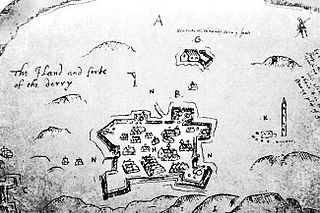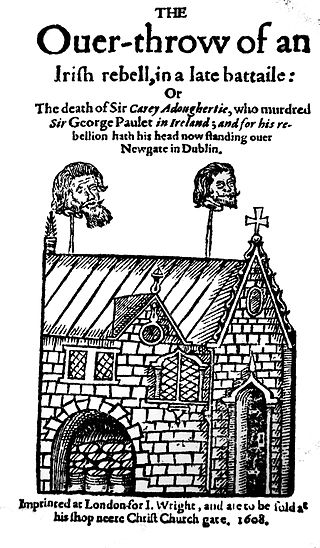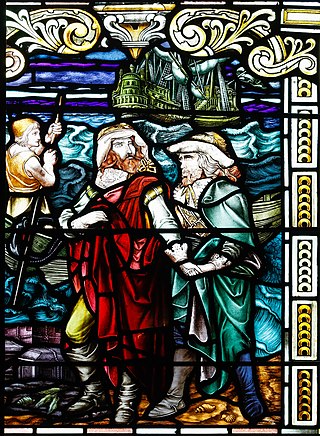Related Research Articles
Niall Garve O'Donnell was an Irish chieftain, alternately an ally of and rebel against English rule in Ireland. He is best known for siding with the English against his kinsman Hugh Roe O'Donnell during the Nine Years' War in the 1590s.

The O’Doherty family is an Irish clan based in County Donegal in the north of the island of Ireland.

Culmore is a village and townland in Derry, County Londonderry, Northern Ireland. It is at the mouth of the River Foyle. In the 2011 Census it had a population of 3,465 people. It is situated within Derry and Strabane district.

Sir Cahir O'Doherty was the last Gaelic Chief of the Name of Clan O'Doherty and Lord of Inishowen, in what is now County Donegal. O'Doherty was a noted loyalist during Tyrone's Rebellion and became known as the Queen's O'Doherty for his service on the Crown's side during the fighting.
McDevitt is an Irish surname, originating in County Donegal in the northwest part of Ireland. This family name is a member of the ancient Northern O’Néill group of clans who resided in the Ulster province of Ireland.
Events from the year 1608 in Ireland.
Sir George Paulet (1553–1608), also known as Pawlett, Pawlet, or Powlet, was an English soldier and administrator. He served as governor of Derry in Ireland. His arrogant and insolent behaviour caused O'Doherty's Rebellion in 1608. Paulet was killed by the rebels during the Burning of Derry.

O'Doherty's Rebellion, also called O'Dogherty's Revolt, was an uprising against the Crown authorities in western Ulster, Ireland. Sir Cahir O'Doherty, lord of Inishowen, a Gaelic chieftain, had been a supporter of the Crown during the Nine Years' War (1593–1603), but angered at his treatment by Sir George Paulet, governor of Derry, he attacked and burned Derry in April 1608. O'Dogherty was defeated and killed in the Battle of Kilmacrennan in July. The rebellion ended with the surrender of the last die-hards at the Siege of Tory Island later in the same year.

Henry Docwra, 1st Baron Docwra of Culmore was a leading English-born soldier and statesman in early seventeenth-century Ireland. He is often called "the founder of Derry", due to his role in establishing the city.

The Burning of Derry took place on 19 April 1608 during O'Doherty's Rebellion when Sir Cahir O'Doherty led a force of rebels to storm Derry in Ulster. He launched his rebellion with an attack on the garrison town of Derry, which was taken thanks to the element of surprise. The town was then almost entirely destroyed by fire.
Sir Josias Bodley (1550-1618) was an English military engineer noted for his service in Ireland during the Nine Years' War. Following the end of the war he remained in Ireland where he oversaw the rebuilding of several major forts. In 1609 he was entrusted with the Bodley Survey which mapped out terrain for the Ulster Plantation.

Burt Castle is a ruined castle located close to Newtowncunningham and Burt, two villages in the east of County Donegal in Ulster, Ireland. Historically it was sometimes spelt as Birt Castle. It is also known by the name O'Doherty's Castle, and should not be mistaken for O'Doherty's Keep near Buncrana.
Henry Hart (1566-1637) was an Anglo-Irish soldier and landowner of the Elizabethan and early Stuart eras. He served in the Nine Years' War (1584-1603) and was later involved in the opening incident of O'Doherty's Rebellion in 1608. As a servitor he acquired an estate in County Donegal.

Phelim Reagh MacDavitt or Phelim Reagh MacDevitt was a Gaelic Irish warrior and landowner notable for his participation in the Nine Years War and later in O'Doherty's Rebellion in 1608. After playing a leading part in the Burning of Derry, he was captured and executed following the Battle of Kilmacrennan.
Sir Ralph Bingley (c.1570–1627) was a Welsh soldier who served and settled in Ireland.
Sir Cormac MacBaron O'Neill (d.1613) was an Irish soldier and landowner of the Elizabethan and early Stuart eras. He was part of the O'Neill dynasty, one of the most prominent Gaelic family in Ireland.
Sir Arthur O'Neill or Sir Art O'Neill was an Irish soldier and landowner. He was part of the O'Neill dynasty, which was the most powerful Gaelic family in Ireland at the time. He was the son of Turlough Luineach O'Neill, the head of the O'Neill dynasty until 1595. He was the second son of Turlough, but his eldest brother Henry O'Neill died in 1578. At times he had a strained relationship with his father, and offered his support to Turlough's rival Hugh O'Neill, Earl of Tyrone. When Tyrone succeeded Turlough as head of the O'Neills and began Tyrone's Rebellion, Arthur offered tacit support to his distant cousin.
Cathbarr O'Donnell was an Irish nobleman.
Conn Oge O'Donnell was a member of the O'Donnell dynasty of Donegal.
The Battle of Lifford was fought in County Donegal in October 1600, during the Nine Years' War in Ireland. A mixed Anglo-Irish force under Sir John Bolle and the Gaelic leaders Niall Garve O'Donnell and Sir Arthur O'Neill captured the strategic town of Lifford. A subsequent attempt to recapture it by forces led by Red Hugh O'Donnell failed.